|
Edited
by Frank R. Shaw, FSA Scot, Dawsonville, GA, USA
Email:
jurascot@earthlink.net
Several things over the past
week have converged which caused me to think more than usual about the old,
out-of-date and seldom used way of communication - letter writing. Just this
weekend I sent a hand-written letter to my sister Peggy who now lives in
Texas who was willing for me to live with her and her family after the death
of both Mama and Daddy, just three months apart, the year I turned fifteen.
That was back in 1953. It is not a stretch to say that for nearly forty
years I have written her once a month.
Then there is George Scott
Wilkie’s new book, Robert Burns: A Life in Letters that I have been
reading lately that started my thought process about letters, you know,
those things left in the attic by our parents that we cherish so much we
will not part with them for love nor money. Yet, since the emergence of
computers and email, we are seldom likely to participate in that activity
they held so dear. You will read a lot more about Wilkie’s excellent book in
a few weeks, so I will stop now as I do not want to get ahead of myself.
Oops, one final word – his is a book I already cherish and which will go
into the “reserve” collection of publications by my desk that I refer to on
a regular basis for speeches and articles.
Then, while cleaning out some
emails from my computer (hoping to get it to work a bit faster!), I ran
across a few from Ian MacMillan way up in Scotland’s Wester Ross. I quickly
popped off a brief return message reminding him it was about time for an
article from him for the pages of Robert Burns Lives! Several years
had gone by since our last communication, so I asked him to update me on
what had been going on with him in his neck of the woods. This is what email
can do that letter writing cannot begin to touch.
Ian sent me the article below.
However, his emails were so interesting and chocked full of details that I
asked his consent to share them with you as well. So with Ian’s permission,
here is the journey of a Burnsian who over the last few years, to say the
least, has been rather busy for Burns. First, his article followed by his
emails.
(FRS: 6.8.11)
Pretty Nancy
By Ian MacMillan
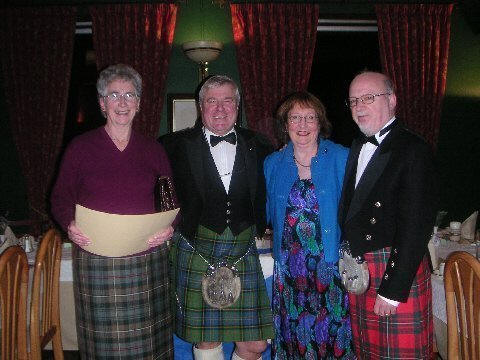
The Wester
Ross Burns Club 2010
‘Ae Fond Kiss.’ Is there
anybody who does not recognise this song, which Sylvander composed for
Clarinda and which Walter Scott later said contained the essence of a
thousand love songs. It is hard to believe that Robert Burns wrote it for
Mrs. Agnes McLehose. She was born Agnes Craig (26/4/1758), the daughter of a
respected Glasgow surgeon Andrew Craig and his wife, whose McLaurin family
came from Tiree.
Agnes was a delicate young
girl, but the only one of the Craig’s four children to survive past the age
of 20. She was known as ‘The Pretty Miss Nancy.’ She grew into an eminent
beauty and amongst other admirers attracted the attention of a young Glasgow
lawyer, James McLehose. The family did not approve of him but James,
learning that Nancy, ’the pretty, little blonde with the pert figure and
dancing eyes,’ was to take a coach from Glasgow to go to boarding school in
Edinburgh, booked all the seats apart from hers for this, then, an all day
journey.
He was handsome, had an
insinuating manner and won her affections. Six months later, ignoring advice
from her family, she became engaged. In 1776 the 17 year old Nancy married
James who was 5 years older. As she grew to know him it soon became clear he
had a foul temper, and was jealous of her, particularly her extremely
capable powers of conversation. In 1780 they separated but by that time had
three children one of whom died in infancy and then a fourth born soon after
they parted.
Under the, then, Scottish
law, the husband was entitled to custody, which James vigorously enforced
but then placed the two children with his relatives, the baby was looked
after by a nurse.
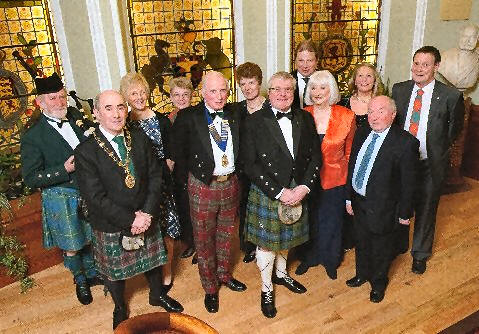
The Immortal
Memory, Inverness Burns Club, Town Hall, January 2008
Dr Craig died leaving Nancy
his estate, which included a house in Trongate and £50. This allowed her to
move to Edinburgh taking the first floor of a house at the back of General’s
Entry, Potterow. Two and a half years later, James, now dissolute, renewed
his interest in his wife, or perhaps in her dowry? He asked for an interview
with her. She refused. He bitterly reproached her and asked that she now
move to Glasgow and place the three children under her protection as he
claimed that by now his relatives wanted nothing further to do with them.
Nancy’s Uncle, Sherrif,
later Lord Craig, now an important Advocate in the Court of Session and also
one of Edina’s well-respected intellectuals, provided her with much needed
financial support which allowed her to take care of her children. When he
died he left her provided for.
James was now in London, a
drunkard in debtor’s prison. His long-suffering mother and the family paid
for him to be set free on the strict condition that he emigrated to Jamaica
as did so many other young Scots who worked on the sugar-cane plantations.
This he did in November 1784.
In November 1787 Robert
Burns came to Edinburgh to arrange a second and more comprehensive
publication of his works. He was feted and lionised by the different classes
of society as Edina’s Enlightenment reached its glittering peak.
In the next month Nancy
arranged to meet him at a tea party and so commenced the famous romance
between Sylander and Clarinda, as they described themselves, so as to keep
their correspondence anonymous, commenced. Thus began one of the greatest
literary love affairs in history.
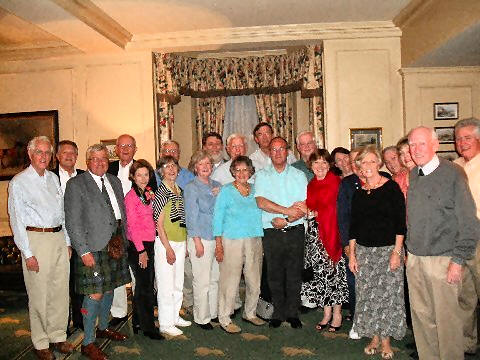
With members
of The Burns Club of Atlanta, on their tour of Scotland's Highlands July
2009
Goodness knows what might
have happened had Robert not suffered a serious accident which he claimed
was caused by a drunken coachman and was virtually confined to his room for
some six weeks. He did demonstrate his physical capabilities however by
impregnating her maid, Jenny Clow, who Nancy was dumb enough to send with a
message to his bed-chamber! Nancy and Robert flirted and conducted a
passionate but platonic romance through meetings and many letters were
exchanged.
Clarinda was a devout
Calvinist (as was Lord Craig) and tried her best to persuade Robert of that
belief and not to stray into sin. This all culminated with the world famous
song of parting in ‘Ae Fond Kiss’ to this charming Grass-widow, after Robert
went back to Ayrshire to marry Jean Armour and commence his new life in
Ellisland then as a ‘gauger’.
In 1792, at her husband’s
request, Nancy went to Jamaica, strangely enough on the Rozelle, the boat on
which Robert Burns had booked the same passage just 6 years before. By now
James was prospering but not prepared to share his wealth. They parted
amicably enough even though James had sired a daughter with a Mulatto slave
woman. James died in 1812 and His estate, worth some £100, passed to his
wife and children.
Of Nancy’s four sons, two
died in infancy, one at 8 years old and the only survivor, Andrew, became a
writer to the Signet. He married and had one son, William Craig McLehose,
who went on to become a Civil Engineer in America, but must have returned
home as he, living in Edinburgh, is named as the sole inheritor of
Clarinda’s Estate in 25 5 1842 (she died intestate.)
The Estate amounted to £106 19s
and 1 pence - I’ll bet he blew the latter!
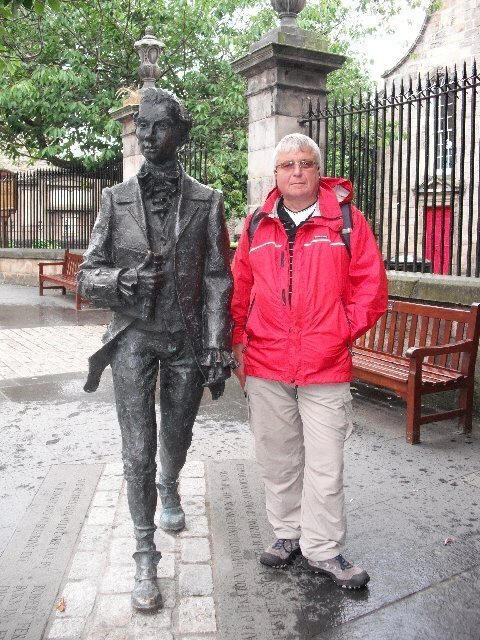
Ian walking
with Robert Ferguson down the Royal Mile 2009
Clarinda died in 1841,
aged 83, some 45 years after Robert Burns. But there was one final poignant
part to this romantic tale. In 1821 the 56 year old Jean Armour met a number
of the Bard’s friends including ‘pretty Nancy.’ Jean said “I well remember
the visit by Agnes McLehose, we had tea together and talked at length about
our families, it was most evident that she had a fondness for Robert.” The
two ladies are said to have got on very well as they swapped tales of the
man, ‘wha should hae had twa wives.’
What would we, Burns
enthusiasts, give to have a recording of that auspicious meeting?
Ian MacMillan, Wester Ross Burns Club
Refs:
James Mackay’s Bio of Robert Burns
Bill Dawson
Clarinda’s will
Jean Armour by Peter Westwood
Burns Chronicle
Editor’s note: Here are the emails:
Good evening Frank.
We are now back home in the
black house. Unfortunately Clarinda, our new Heilan heifer, broke down the
divider wall while trying to get at our stovies and disabled the broadband.
Luckily Gordon Dunlop Creech Nichol Glencairn managed through the blizzards
and re-connected using a Lewars/Armour technique.
I have read through the vast
increase in your 'Burns Lives' compendium and am hugely impressed. Do you
intend to get this lot bound in fine vellum and offer it for subscription to
your adoring fans? If so sign me in!!!!
I asked myself, dare I
submit another of my Ayrshire wanderings along-side the eminence of Purdie,
Carruthers, Reader et al and very firmly answer YES
However I note your pieces
are quite short, so may I humbly submit the attached tribute to a short but
memorable affair in our Bard's life.
I sign off with a recent
sunrise from our bedroom windae.

All the best in Burns, Ian
Frank,
I suspect you may not wish
to include the story that follows on, written for a school re-union but I
thought it might amuse you. The latter half is of course fiction
My first memory of our Bard
is being scared with my brother and sister as my father, as Holy Willie,
launched into a candle-lit prayer. Then passing quickly over my school-days,
like so many I put my Kilmarnock aside until, in my forties, we were invited
to a Supper in a friend's home in Morpeth, Northumberland, where we then
lived. We had a cracking night and I became more and more involved to the
extent that my own bonnie Jean would describe as fanatical
We had several Suppers in
our and other's homes in England and I first learned 'The Haggis', then 'The
'Prayer' then 'The Louse.' Stemming from this, Burns Suppers were held for
the first time at the rugby, golf, and sailing clubs. Then several at
Kielder Water as I worked for Northumbrian Water.
When we moved to The
Hielans some 8 years ago I established The Wester Ross Burns Club who have
held a Supper and various events since then.
I have viciously stabbed
many Haggii, held candles in my off-white goonie, and have had the honour to
address The Immortal Memory about a dozen times I think. Last year I gave
this address in Dingwall then travelled to Southend in The Mull of Kintyre
to do the same, almost as far as you can travel in Scotland.
I am a personal member of
the Burns Federation and have made friends with well-kent figures in the
Burns world.
In 2009 on the occasion of
the 250th Anniversary I acted as a guide to a group from Atlanta Burns Club
who retraced Rabbie's travels in the HIghlands from Edinburgh to Inverness.
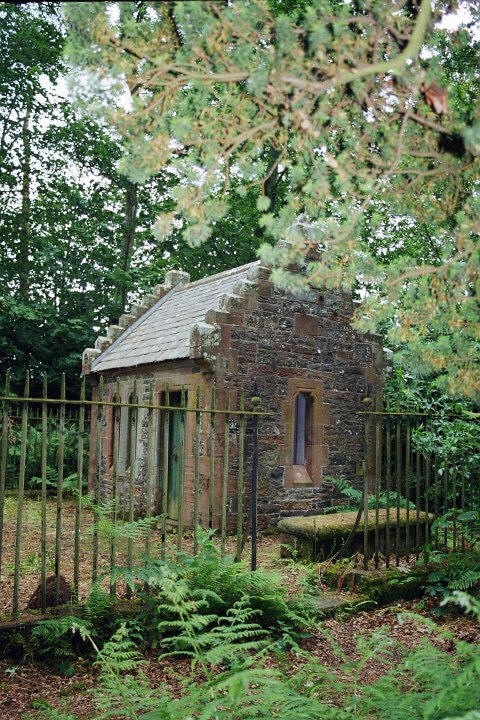
Friars Carse cottage where Burns stayed
temporarily while Ellisland was being completed
Articles include 22 days, an
account of Robert Burns Highland journey. A three part programme on local
radio covering his life and pieces for The Chronicle including Pretty
Nancy, Burns diamond stylus, and Burns and drink
I know one could spend
several life-times learning more and more about and from this young man of
this wee country so long ago, as my respect for his achievements grows.
All the best, Ian
I owe a great deal to Olny.
He, Mr. Easson, was my English teacher in Hillhead High School, Glasgow.
From him, I developed a life-long love of literature and poetry. I am deeply
grateful that his skill as a teacher encouraged this interest in my life.
There were only two
problems, the first being his. This articulate, well-read man just could not
pronounce the word properly. He always mis-said it as olny. We used to watch
with bated breath as he headed fluently, but inevitably towards another mis-pronunciation.
We were never disappointed, hence the nickname known to generation upon
generation of young scholars.
The second problem was, I am
sure, a major factor in the fearsome stutter that was to plague my pimpled
teens. Can you imagine my terror when his imperious gaze focused on me and
he said “Ian, your recitation please!” To my intense embarrassment I stood
up before the class, who quivered to attention to watch the spectacle as
eagerly as women knitting by the guillotine. Even worse was that I had to
stumble through ’O my Luve’s like a red red rose’ to sniggers from my
supposed friends. My hesitant delivery was not at all helped by Peem
McNaughton at the desk behind, jabbing his, especially sharpened, dividers
through my thin shorts. But worse by far was knowing that three rows across
and two desks down sat Venus. Irene McMeechan had golden hair like rippling,
sun-kissed corn, eyes of agate blue, a twinkling smile and a laugh capable
of creating sudden coronaries. You may have gathered I quite liked her.
I am very glad to let you
know that, a short while later, we had exchanged more than our School
scarves! Also that, in spite of this ordeal, I later rediscovered ‘A red red
rose’ and developed an increasing interest and pleasure in the rest of the
works of Scotland’s Bard, Rabbie Burns.
I was nearing retirement
age when I took part in the programme on BBC 4. Our group discussed the
relative importance of the contributions to Scottish literature of Robert
Burns, Jessie Kesson and Hugh MacDiarmid. When I watched my copy of the
video later, I smiled as I remembered Olny and events so long in the past. I
was therefore completely taken aback when, shortly afterwards, I received a
telephone message. It was from ‘Campsie Glen Sheltered Homes’ and the gist
was that a Mr. Easson had seen the TV programme and would like to meet me.
He was sitting in his own
room looking out over the hills. He was smartly dressed in sports jacket and
flannels. Perhaps he had dressed especially for the occasion but I suspected
that was the way he liked to appear. I pretended not to notice the signs of
increasing frailty following his stroke. We chatted over old times and he
told me how much he had enjoyed the discussion on television. After a while
I could see that he was getting tired so started to make verbal moves
towards my farewell. He stopped me and said, “Ian, there is one thing I
wanted you to understand. All teachers know their nick names. I was quite
pleased with mine. You see it is a very difficult thing for any teacher to
find a way of drawing teenagers attention to their studies when it is so
obvious that, while hormones are surging through their fit young bodies,
they are far more interested in gaining the respect of their friends and,
particularly, of the other sex than some aged teacher. So you see I was only
joking!”
Ian MacMillan |

